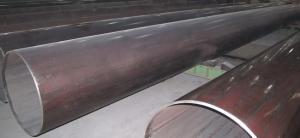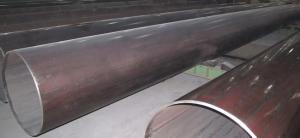52''-64'' CARBON STEEL LSAW WELDED PIPE API/ASTM/JIS/DIN
- Loading Port:
- Tianjin
- Payment Terms:
- TT OR LC
- Min Order Qty:
- 5 m.t
- Supply Capability:
- 300 m.t/month
OKorder Service Pledge
OKorder Financial Service
You Might Also Like
Packaging & Delivery
Packaging Detail: | standard export packing or as customer's requirement |
Delivery Detail: | within 10 - 30 days |
Specifications
Spiral Welded Steel Pipes and Tubes
1.Material:Q195-Q235
2.Length:1-12m
3.WT:1.0-14mm
4.O.D.:20-273mm
Product Description:
1.Material : Q235,Q345,L245,L290,L360,L415,L450,L485,GrB,X42,46,X52,X56,X60,X65,X70,X80,X100
2,Standard: SY/T5037-2000,GB/T9711-2011,API Spec 5L PSL1/PSL2,ASTM A252\A53,ISO3183,DIN17172,EN10217,JIS G3457,AWWA C200,ASTM A139,ASTM A671,ASTM A672
3.Wall thickness: 3.0mm-30mm
4.Outer diameter: φ168mm-3020mm
5,Length: 5m-12m or as your requirement
6,Corrosion protection standard: DIN30670,DIN30671, AWWAC210, AWWA C203, SY/T0413-2002,SY/T0414-2002
7,Application: Oil, gas, natural gas, water pipe, thermal electricity pipe, steel structure engineering, etc
Q195-q345 Material Steel Pipe's Materials
Elements | Chemical Compsition% | Mechanical Property | ||||||
C% | Mn% | S% | P% | Si% | Yield Point (Mpa) | Tensile Strength(Mpa) | Elongation | |
Q195 | 0.06-0.12 | 0.25-0.50 | <0.050< span=""> | <0.045< span=""> | <0.030< span=""> | >195 | 315-430 | 32-33 |
Q215 | 0.09-0.15 | 0.25-0.55 | <0.05< span=""> | <0.045< span=""> | <0.030< span=""> | >215 | 335-450 | 26-31 |
Q235 | 0.12-0.20 | 0.30-0.70 | <0.045< span=""> | <0.045< span=""> | <0.030< span=""> | >235 | 375-500 | 24-26 |
Q345 | <0.20< span=""> | 1.0-1.6 | <0.040< span=""> | <0.040< span=""> | <0.55< span=""> | >345 | 470-630 | 21-22 |
Packaging & Delivery
Packaging Detail: | Normal exporting packing,in container or bulk vessel or as per clients' request |
Delivery Detail: | 2 months after confimed contract |
Specifications
Large Diameter API 5L X70 PSL2 LSAW Steel Pipe
Grade: X42, X46, X50, X52, X60, B, C
OD: 1.5"-28"
WT: SCH10-SCH160
Brand:TPCO
Large Diameter API 5L X70 PSL2 LSAW Steel Pipe
Specifications:
u Standard: API 5L
u Grade: B, C, X42, X46, X50, X52, X56, X60, X65, X70, X80
u OD: 1.5"-28"
u WT: SCH10-SCH160
u Length: 5-12m
u Ends Finish: plain end, bevel end, grooved end
u Surface Treatment: bare, black varnished, oiled finish, red color, anti-corrosion, 3PE, FBE or epoxy coating
u Technique: hot rolled or cold drawn
u Application: api 5l steel pipe for conveying oil, water, gas
u Invoicing: based on theoretical weight or actual weight
u Payment Terms: L/C at sight, T/T or Western Union
u Trade Terms: FOB, CFR, CIF
u Certification: ABS manufacturing assessment, ABS design assessment, API 5CT, API 5L, DNV manufacturer certificate, ISO9001 quality management system certificate, ISO14001 environment management system certificate, GB/T28001 occupational health and safety management system certificate, A1 class manufacturing license of special equipment certificate, CCS, GL, LR, SGS, TüV, PDE
- Q:How are steel pipes used in the construction of high-rise buildings?
- Steel pipes are commonly used in the construction of high-rise buildings for various purposes, including structural support, plumbing, and fire protection. These pipes provide strength and durability to support the weight of the building, allowing for taller structures. They are used to create the building's framework, as well as for the distribution of water, gas, and other utilities throughout the building. Additionally, steel pipes are often used for fire sprinkler systems, providing a reliable and efficient method of fire protection in high-rise buildings.
- Q:What is the difference between steel pipes and PVC-U pipes?
- Steel pipes and PVC-U pipes differ in their composition, durability, and application. Steel pipes are made from iron and carbon, providing them with high strength and resistance to extreme conditions. They are commonly used for transporting water, gas, and oil in industrial settings due to their durability and ability to withstand high pressure and temperature. PVC-U pipes, on the other hand, are made from a synthetic plastic called polyvinyl chloride. They are lightweight, corrosion-resistant, and easy to install, making them ideal for residential plumbing, irrigation systems, and drainage. While steel pipes are more robust and suitable for heavy-duty applications, PVC-U pipes are cost-effective, versatile, and suitable for lighter applications.
- Q:What are the different methods of coating steel pipes?
- There are several methods of coating steel pipes, including fusion bonded epoxy (FBE) coating, polyethylene (PE) coating, polyurethane (PU) coating, and cement mortar lining. These coatings are applied to protect the steel pipes from corrosion, increase their lifespan, and improve their performance in various applications.
- Q:Can steel pipes be used for geothermal applications?
- Yes, steel pipes can be used for geothermal applications. Steel is a durable and strong material that can withstand high temperatures and pressures typically found in geothermal systems. It is commonly used for drilling wells and transporting geothermal fluids, making it a suitable choice for geothermal applications.
- Q:How do steel pipes withstand pressure?
- Steel pipes are able to withstand pressure due to their high strength and durability. The material properties of steel, including its tensile strength and resistance to deformation, allow it to withstand the internal forces caused by pressure without experiencing significant distortion or failure. Additionally, the seamless construction of steel pipes ensures that there are no weak points or joints that could compromise their ability to withstand pressure.
- Q:What are the different coatings applied to steel pipes?
- There are various coatings that can be applied to steel pipes to enhance their durability and protect them from corrosion. Some common coatings include fusion-bonded epoxy (FBE), which provides excellent corrosion resistance, and polyethylene (PE), which offers high impact strength. Other coatings include polyurethane (PU) and coal tar enamel, which provide additional protection against abrasion and chemical corrosion. Additionally, zinc coatings such as hot-dip galvanizing are used to prevent rust and extend the lifespan of steel pipes.
- Q:How do steel pipes handle thermal expansion and contraction?
- Steel pipes are able to handle thermal expansion and contraction due to their unique properties and design. When exposed to high temperatures, steel pipes expand as the molecules within the material gain energy and move more vigorously. Conversely, when exposed to low temperatures, steel pipes contract as the molecules lose energy and move less vigorously. To accommodate these changes, steel pipes are manufactured with certain features. One such feature is the allowance of clearance between pipe joints. This clearance allows for expansion and contraction without causing stress or deformation in the pipe. Additionally, the use of expansion joints or flexible connectors within the piping system helps to absorb the thermal movements and prevent damage. Furthermore, steel pipes are often installed with proper anchoring and support systems. These systems are designed to allow the pipes to freely expand and contract within a certain range without causing excessive stress or strain on the structure or surrounding components. Anchoring and support systems also help to maintain the overall stability and integrity of the piping system. In some cases, thermal insulation materials are applied to steel pipes to minimize temperature changes and reduce the effects of expansion and contraction. These insulating materials help to maintain a more consistent temperature within the pipe, reducing the magnitude of thermal movements. Overall, steel pipes are well-suited to handle thermal expansion and contraction due to their inherent strength and flexibility. With proper design, installation, and maintenance, steel pipes can effectively accommodate temperature changes without compromising their structural integrity or functionality.
- Q:What are the different types of coatings used on steel pipes?
- Steel pipes can be coated with various types of coatings to increase their durability and protect them from corrosion. Some commonly used coatings are: 1. Fusion-Bonded Epoxy (FBE) Coating: The steel pipe is heated and the epoxy powder is melted and fused to the surface. FBE coatings offer excellent corrosion resistance and are widely used in water pipelines and the oil and gas industry. 2. Polyethylene (PE) Coating: Similar to FBE coatings, PE coatings are applied to steel pipes. They provide a protective layer that is resistant to moisture, chemicals, and abrasion. PE coatings are commonly used in gas pipelines and underground water pipelines. 3. Polypropylene (PP) Coating: PP coatings have similar application processes and protective qualities as PE coatings. However, they offer enhanced resistance to higher temperatures, making them suitable for chemical processing plants and refineries. 4. Concrete Weight Coating (CWC): This special coating involves applying a layer of concrete to the steel pipe. It adds weight to the pipe, making it more stable and resistant to buoyancy in underwater or submerged applications. 5. Zinc Coating: Zinc coatings, such as hot-dip galvanizing, involve immersing the steel pipe in molten zinc. This creates a protective layer of zinc on the pipe's surface, offering excellent corrosion resistance. Zinc coatings are commonly used in outdoor applications, such as fencing, guardrails, and water pipelines. 6. Bituminous Coating: Bituminous coatings involve applying a layer of bitumen or asphalt to the steel pipe. They provide excellent resistance to water and chemicals, making them suitable for underground pipelines and structures. These examples illustrate the variety of coatings available for steel pipes. The choice of coating depends on factors like the intended application, environmental conditions, and desired level of corrosion resistance.
- Q:What is the lifespan of steel pipes?
- The lifespan of steel pipes can vary depending on various factors such as the quality of the steel used, the environment in which they are installed, and the maintenance and care they receive. However, typically, steel pipes can last for several decades or even up to a century if properly installed and maintained.
- Q:There are multiple welded galvanized steel pipe outer diameter 108mm wall thickness 4mm length of 6 meters
- Galvanized steel pipe is divided into cold galvanized steel pipe, hot galvanized steel pipe, cold galvanized steel pipe has been banned, and the latter is also advocated by the state for the moment, can be used. In 60s and 70s, developed countries began to develop new types of pipes, and galvanized pipes were banned. China's Ministry of construction and other four ministries also issued a civilization, indeed from two, 000 years since the galvanized pipe as a water supply pipe, the New District cold water pipe has rarely used galvanized pipe, and some of the hot water pipe is galvanized pipe. Hot dip galvanized steel pipe is widely used in fire, power and highway.
1. Manufacturer Overview |
|
|---|---|
| Location | |
| Year Established | |
| Annual Output Value | |
| Main Markets | |
| Company Certifications | |
2. Manufacturer Certificates |
|
|---|---|
| a) Certification Name | |
| Range | |
| Reference | |
| Validity Period | |
3. Manufacturer Capability |
|
|---|---|
| a)Trade Capacity | |
| Nearest Port | |
| Export Percentage | |
| No.of Employees in Trade Department | |
| Language Spoken: | |
| b)Factory Information | |
| Factory Size: | |
| No. of Production Lines | |
| Contract Manufacturing | |
| Product Price Range | |
Send your message to us
52''-64'' CARBON STEEL LSAW WELDED PIPE API/ASTM/JIS/DIN
- Loading Port:
- Tianjin
- Payment Terms:
- TT OR LC
- Min Order Qty:
- 5 m.t
- Supply Capability:
- 300 m.t/month
OKorder Service Pledge
OKorder Financial Service
Similar products
New products
Hot products
Related keywords





























